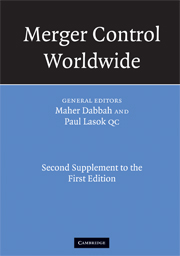Book contents
- Frontmatter
- Contents
- List of contributors
- Table of cases
- Table of legislation
- Introduction to the Second Supplement
- Introduction to the First Supplement
- 1 Argentina
- 2 Armenia
- 3 Australia
- 4 Austria
- 5 Belgium
- 6 Brazil
- 7 Canada
- 8 Chile
- 9 China
- 10 Denmark
- 11 European Union
- 12 Germany
- 13 Greece
- 14 Iceland
- 15 Italy
- 16 Japan
- 17 Republic of Korea
- 18 Malta
- 19 Mexico
- 20 The Netherlands
- 21 New Zealand
- 22 Norway
- 23 Singapore
- 24 Spain
- 25 Switzerland
- 26 Taiwan
- 27 Ukraine
- 28 United Kingdom
- 29 United States of America
- Index
21 - New Zealand
Published online by Cambridge University Press: 30 July 2009
- Frontmatter
- Contents
- List of contributors
- Table of cases
- Table of legislation
- Introduction to the Second Supplement
- Introduction to the First Supplement
- 1 Argentina
- 2 Armenia
- 3 Australia
- 4 Austria
- 5 Belgium
- 6 Brazil
- 7 Canada
- 8 Chile
- 9 China
- 10 Denmark
- 11 European Union
- 12 Germany
- 13 Greece
- 14 Iceland
- 15 Italy
- 16 Japan
- 17 Republic of Korea
- 18 Malta
- 19 Mexico
- 20 The Netherlands
- 21 New Zealand
- 22 Norway
- 23 Singapore
- 24 Spain
- 25 Switzerland
- 26 Taiwan
- 27 Ukraine
- 28 United Kingdom
- 29 United States of America
- Index
Summary
Undertakings
The Commerce Commission has outlined the factors it considers in assessing the extent to which the submitting undertaking would allay anticipated concerns resulting from a given merger operation. The Commission examines three types of risks which could undermine the efficacy of an undertaking:
composition risks: risks associated with the scope of the assets to be divested, which may not be sufficient to attract a buyer or may not allow a purchaser to operate effectively and viably in the market;
purchaser risks: risks associated with the person purchasing the assets. The Commission will consider the incentives for an applicant to divest to a strategically weak purchaser; and
asset risks: risks associated with the loss of value or competitive capability of the assets during the divestment process.
Substantive assessment and test
The High Court's recent decision in Commerce Commission v. New Zealand Bus (2006) 3 NZCCLR 111 provided useful guidance on the “substantial lessening of competition” test in New Zealand. Prior to this decision, there was limited case law on the topic, with the High Court's decision in Brambles New Zealand Ltd v. Commerce Commission, the only statement on this test.
Miller J's judgment confirmed the principles that had been applied in previous cases, and his decision provides a useful summary of the way to approach the question of whether a substantial lessening of competition as a result of a merger operation is likely in the New Zealand context:
The question whether a substantial lessening of competition is likely is determined by comparing the likely state of competition should the acquisition proceed (the factual) with the likely state of competition if it does not (the counterfactual): Tru Tone Ltd v Festival Records [1988] 2 NZLR 352 (CA).
- Type
- Chapter
- Information
- Merger Control WorldwideSecond Supplement to the First Edition, pp. 109 - 110Publisher: Cambridge University PressPrint publication year: 2008

